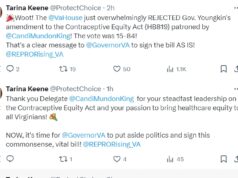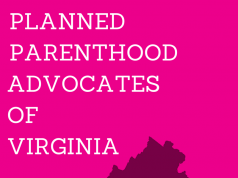by Del. Mark Levine
I have worked hard for decades to combat the unwarranted stigma too many in society impose on survivors of domestic and sexual violence. A year and a half ago, I even gave a Keynote Speech addressing this topic at the World Bank.
If someone holds me up at gunpoint and asks for my wallet, I’m a sympathetic victim. Most everyone seems to understand that the mugger is the bad guy and the victim innocent.
But when a woman is the victim of sexual assault or domestic violence, all too often the questions swirl around her: why was she dating him? why was she drinking? why was she out late at night? why was she wearing that outfit? why didn’t she leave him? why, after she left him, didn’t she put triple locks on her doors and get a restraining order and a gun and be eternally paranoid looking around her everywhere she goes and not drop her attention for just one moment lest she be surprised and harmed?
It’s almost as if the victim-shamers don’t believe women have a right to dress as they please, go where they want, hang out with their friends, have a drink or two, and not live their lives eternally fearing assault at any moment — just like men do.
I don’t know of any other crime where we blame the victim this much. And this victim-blaming has consequences. It causes victims to be less likely to speak out and report the crimes that have happened to them. And as the vast majority of these crimes are committed by people who have done them before, this dangerous stigma, by shaming victims, actually helps perpetrate more violence.
There is nothing wrong with encouraging people to take precautions. I have oftentimes walked a friend of mine to her car when we are together after dark because I know it can be unsafe for a woman to walk alone at night. My parents taught me this basic etiquette. But the fact that I feel I have to do this, even if necessary, is still a horrible indictment only of the person who commits a violent crime. Not of the victim. It’s certainly not the victim’s fault if she must walk alone at night and then gets attacked. And plenty of women (and men) are attacked in the daytime. The vast majority of sexual violence — and all domestic violence, by definition — is perpetrated by someone the victim knows. So walking a woman to her car can’t stop the vast majority of these horrific crimes. Some of them are just unescapable.
It can never be said often enough: the person at fault for a violence crime is the person who initiated the violence. I don’t know all the details of what happened to Yeardley Love, but it appears that she did break up with her killer. And he, in turn, broke into her apartment and murdered her in her bedroom. There was not much she could do about that. (And no, NRA fans, the answer was not for her to have a loaded gun by her bedside. That, on average increases the likelihood fivefold of a victim of domestic violence being murdered.) Rarely does a murder victim know they are going to be killed until it’s too late…particularly when the killer is someone who used to love them.
So for all these reasons, the radio comments by my friend Arlington School Board Member James Lander pain me. It’s clear to me that he was trying to talk about society’s obligations to fully educate young men and women beyond academics and to learn about life itself. He wants students to be wise, not just smart. But his initial radio comments were not well put. They blamed the victim. First of all, we must educate young men and women on what is proper conduct in our society, because crimes of violence are entirely the perpetrators’ fault. And only as a second priority while making clear that victims are not at fault must we also encourage survivors of sexual or domestic violence to speak out about what happened to them. Because only by letting people know how common the problem is, will our society understand the necessity of doing something serious about it. And male victims of sexual violence must speak out as well. For them, the stigma against speaking out is often more powerful than even the stigma against women survivors.
I’ve spoken at length with James Lander. I believe his apology to be sincere. He sorely recognizes he needs more education on this issue, and that’s a good thing. I’m working on helping him get that education and to hear the painful words of survivors themselves. We need more than his apology. We need active learning and reaction. Fortunately, I’m confident that James will delve more deeply into this issue than he ever has before. That will turn this unfortunate gaffe into a very important learning experience for him, for Arlington, and for the entire community. Technically, I will hold my endorsement in abeyance to see how he reacts. But I have little doubt he will do the right thing. Not for some political reason but because he genuinely is coming to understand how severe this problem is, both in Arlington schools and in schools and homes all across the nation. I truly hope and expect Lander’s unfortunate statement will serve as a catalyst for positive change.
This should be a lesson for all of us. It’s much greater than Lander’s ill-advised words. We must stop victim-blaming, even as we encourage victims to take action to protect themselves. And frankly, we must understand how widespread this problem is. I must admit that a year before my sister was murdered, I watched with horrified fascination the OJ Simpson trial, thinking that such a thing could never happen in my own family. I was sadly, terribly wrong.
I myself used to have trouble speaking out about this. When my sister was murdered, I considered it a private tragedy, a horrific thing that my family had to undergo. It was painful to talk about it. And I wanted people to judge my work — and, later, vote for me — based on what I had done and not because they felt sorry for my family or me.
But I’ve come to learn that not speaking out is a greater danger. Just as coming out as gay or lesbian or bisexual or transgender helps everyone in the Rainbow (LGBT) Community, coming out as a survivor of domestic or sexual violence encourages all survivors to tell their stories. It decreases the stigma. It lets people know they are not alone. And the more people tell their stories, the more we prevent these horrific crimes. In fact, I know that my own speaking out has led many of my constituents to feel safe confiding in me the violence that has been perpetuated on them. I thank you all for sharing your stories. We must make clear: domestic and sexual violence is widespread. It is an epidemic. It’s a three-alarm fire.
The single best example I’ve ever seen of heart-felt, wrenching testimony about sexual violence has been at the Rally Against Rape, which I’ve attended for three years now. I will be going back for a fourth year this Thursday April 27 at 6 pm at Gateway Park. Please join us. Caroline Romano does an amazing job, on a shoestring, at bringing together hundreds of people in a compassionate environment to share their stories. It’s not really a “rally” at all. No signs. No chants. It’s a safe space, a therapy and healing session, for all victims of sexual assault, women and men, young and old, those who have reported the crimes and those who have told no one before, to share their powerful and painful experiences with a caring community.
Specifically, I’d like to ask more men to attend this year. Every time I’ve been there, it seems the female to male ratio is about 5 to 1. It’s OK if you feel uncomfortable. It’s not a comfortable topic. And it’s OK if you don’t talk. For most of us, it’s just best if we sit and listen. But this is a great way to show your support and a great way to be educated on an issue that affects at least one in five American women sometime in their lifetime.
So men, please join us. The vast majority of men are not the problem. But we have to rally our resources against those who are the problem, and the only way to do that is by understanding the circumstances people have undergone and work together as a community to remove the stigma and provide resources to survivors.
Let’s make this a real learning and healing experience for our community.


 Sign up for the Blue Virginia weekly newsletter
Sign up for the Blue Virginia weekly newsletter

![VA Senators, Delegates Rip Gov. Youngkin’s Veto of Bill That Would Have Closed “Boyfriend Loophole,” for “put[ting] victims of sexual and domestic abuse in grave danger”](https://bluevirginia.us/wp-content/uploads/2024/04/doorways1-238x178.jpg)






